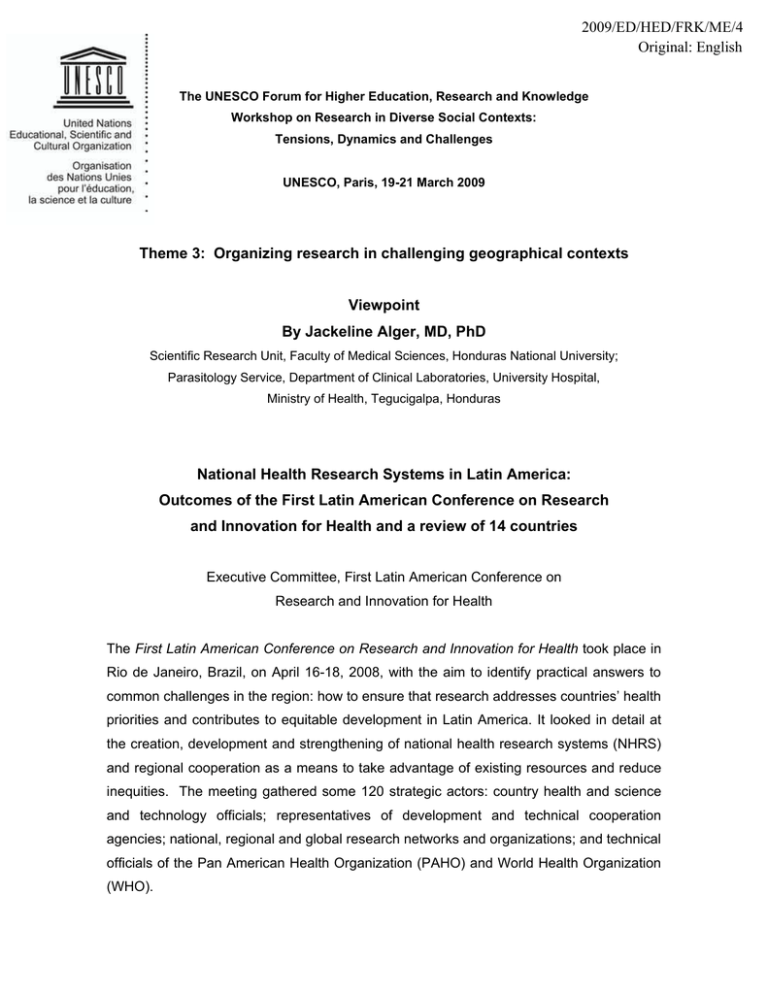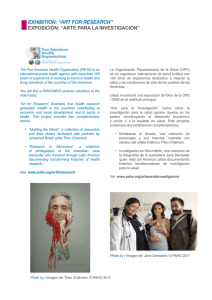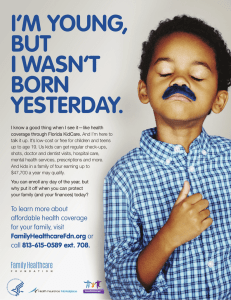National health research systems in Latin America - unesdoc
Anuncio

2009/ED/HED/FRK/ME/4 Original: English The UNESCO Forum for Higher Education, Research and Knowledge Workshop on Research in Diverse Social Contexts: Tensions, Dynamics and Challenges UNESCO, Paris, 19-21 March 2009 Theme 3: Organizing research in challenging geographical contexts Viewpoint By Jackeline Alger, MD, PhD Scientific Research Unit, Faculty of Medical Sciences, Honduras National University; Parasitology Service, Department of Clinical Laboratories, University Hospital, Ministry of Health, Tegucigalpa, Honduras National Health Research Systems in Latin America: Outcomes of the First Latin American Conference on Research and Innovation for Health and a review of 14 countries Executive Committee, First Latin American Conference on Research and Innovation for Health The First Latin American Conference on Research and Innovation for Health took place in Rio de Janeiro, Brazil, on April 16-18, 2008, with the aim to identify practical answers to common challenges in the region: how to ensure that research addresses countries’ health priorities and contributes to equitable development in Latin America. It looked in detail at the creation, development and strengthening of national health research systems (NHRS) and regional cooperation as a means to take advantage of existing resources and reduce inequities. The meeting gathered some 120 strategic actors: country health and science and technology officials; representatives of development and technical cooperation agencies; national, regional and global research networks and organizations; and technical officials of the Pan American Health Organization (PAHO) and World Health Organization (WHO). The Conference was a product of an alliance between the Ministry of Health of Brazil, PAHO, the Mexican Coordinator Commission of National Institutes for Health and High Specialty Hospitals (Comisión Coordinadora de Institutos Nacionales de Salud and Hospitales de Alta Especialidad de México, INSalud), the Council on Health Research for Development (COHRED), the Global Forum for Health Research (GFHR) and NicaSalud, Nicaragua. This paper provides a synthesis of the background papers prepared for the Conference. Each country paper was written by a team of national experts based on a common format adapted from the COHRED NHRS Development Framework. The fourteen country papers were written in late 2007 – early 2008 for: Argentina, Bolivia, Brazil, Chile, Costa Rica, Cuba, Ecuador, El Salvador, Honduras, Panama, Paraguay, Peru, Uruguay and Venezuela. The papers described: governance and management structures; the national policy framework – in particular human resources and financing strategies; research priorities and the priority setting process employed; formal research dissemination and utilization structures; specific innovation structures and policies, and other issues identified as important by each country. Data was collected from national policy documents, databases, interviews with senior figures in research and policy and the writing team’s own knowledge of national health research systems. The participants to this meeting debated in four working groups which produced a series of recommendations on the central themes of the Conference: National Health Research Systems, Human resources for health research, Funding of research for health and Innovation, product development and access. These working groups stressed that the strengthening and regulatory role of NHRS and regional cooperation are vital to face the challenges to health and promote the equitable development in Latin America. For this, it is necessary to prioritize at the highest level of the national and international political agenda research for health and the equitable distribution of its results and benefits, in a democratic environment and assuring citizen participation. All the groups coincided in a strategic vision: the regulatory role of the NHRS, including research, development and distribution of technologies, is a non-transferable government responsibility. This is the only effective way to articulate research and innovation with public health and development priorities. To make possible this vision, strategic action lines were proposed: 1) The government should exert the regulatory role of the NHRS through the Ministry of Health with support from other governmental and non-governmental actors. 2) The NHRS should establish and update research priorities, with the purpose of optimizing resources and respond to the evidence needs of the health system and the national developmental goals. Research grants and human resources for health research should be linked to priorities, through systematic, participative and transparent mechanisms. Monitoring and evaluation of research financing and human resource development will be key issues. 3) The NHRS should promote a political, legal and educative environment to favor equity driven research. This requires the establishment of regulatory frameworks that persist through different governments; the integration of science, technology and innovation in the routine operation of the NHRS; the use of scientific information to make inclusive health policies; and to grant incentives to work in research, with the purpose of generating and keeping a critical mass of scientists. The groups recommended specific actions: to create and apply laws that protect research ethics and to establish mechanisms that control and assure the information provision; to promote discussion about informed consent in indigenous populations and other vulnerable groups. 4) In regard to human resources training, it was recommended the following: to educate and train researchers through participation in projects related to NHRS priorities; to establish evaluation systems for researchers incorporating new evaluation criteria; to form multidisciplinary teams with a wide vision of research for health, promoting their stability and training of their scientific and non-scientific personnel; to facilitate the links with productive sector; to promote an integrated training, directed to improve proposal’s methodological quality, respect for ethical principles, project management, team work, communication and use of research results. 5) In regard to financing, it was recommended: to look for innovative strategies to obtain funding such as taxes on industries that contribute to the cause of disease and deaths (tobacco, alcohol, cars); to include health research agreements in the multilateral bank loans; to take into account the project quality when granting funding but to avoid criteria that make academic education and prestige barriers; to inform health system officials and those taking decisions on public heath investment about the strategic advantages and added value of research. 6) For innovation, the following was recommended: to strengthen drug regulatory agencies; to promote transparency of the public buying system; to promote access of the population to social and technological innovative products; to incorporate traditional medicine into the innovation cycle with special attention to the equitable distribution of obtained benefits. The conference ratified a common strategic vision: that regional cooperation is a key factor to consolidate the NHRS, conciliate the intellectual property and public health interests and to reduce inequities in knowledge, financing and technology matters. To take this vision to practice, some action lines were outlined with the purpose of taking advantage of existing capabilities, and specific activities were proposed in relation with different lines: to generate strategies and collaborative projects based on common and supplementary goals, to confront the challenge to conciliate the intellectual property and public health interests and to harmonize the regulatory frameworks and processes existing in different countries. The international agencies of technical cooperation, particularly PAHO and COHRED, could guide the development of NHRS and contribute to the continuity of multinational initiatives. In addition to the 14 country papers (available from http://www.cohred.org/main/publications/ background_papers.php) and recommendations, outcomes from the Conference included the facilitation of networking between countries, organizations, international agencies and financing institutions; information on new programs, fellowships and financing sources; a preliminary agreement for sub-regional cooperation in Central America; and a commitment to organize a Second Conference to evaluate progress, which will take place in Havana, Cuba, on November 16-20, 2009. The information from the papers and the debates of the Conference working groups will be key elements in the design of national health research policies and the definition of development and strengthening strategies for NHRS. This information was used by governments and civil society organizations as inputs to the Global Ministerial Forum on Research for Health that took place on November 2008 in Bamako, Mali. The findings and recommendations will also contribute to the policy design of PAHO and other international agencies related to health research. Responsible for abstract preparation: Jackeline Alger (1), Andrew Kennedy (2), Francisco Becerra (2). (1) Facultad de Ciencias Médicas, Universidad Nacional Autónoma de Honduras, and University Hospital, Ministry of Health, Tegucigalpa, Honduras; (2) Council on Health Research for Development (COHRED), Geneva, Switzerland. Executive Committee, First Latin American Conference on Research and Innovation for Health. Suzanne Serruya Jacob, Brazil Ministry of Health; Analia Porras, Luis Gabriel Cuervo, Pan American Health Organization/World Health Organization; Sylvia de Haan, Carel IJsselmuiden, Council on Health Research for Development (COHRED); Andres de Francisco, Stephen Matlin, Sylvie Olifson, Global Forum for Health Research; Josefina Bonilla, NicaSalud Network Federation; Francisco Becerra, INSalud, Mexico Members of Country Teams. Zulma Ortiz (Academia Nacional de Medicina, Argentina), Silvia Kochen (Agencia Nacional de Promoción Científica y Tecnológica, Argentina), Elsa Segura (Consejo Nacional de Investigaciones Científicas y Técnicas, Argentina); Tara Bickis (Ministerio de Salud, Bolivia), Sara Pérez (Universidad Mayor de San Andrés, Bolivia), Eduardo Aranda (Academia de Medicina, Bolivia); Suzanne Serruya (Ministerio de Salud, Brasil), Moisés Goldbaum (Universidad de Sao Paulo, Brasil), Reinaldo Guimaraes (Ministerio de Salud, Brasil), Paulo Buss (FIOCRUZ, Brasil), Carlos Morel (FIOCRUZ, Brasil); Marisol Navarrete (Fondo Nacional de Investigación en Salud, Chile), Tomas Pantoja (Pontificia Universidad Católica de Chile, Chile), Rodrigo Salinas (Ministerio de Salud, Chile), Fernando Muñoz (Ministerio de Salud, Chile); Luis Tacsan (Ministerio de Salud, Costa Rica), Xinia Gómez (Ministerio de Salud, Costa Rica), Patricia Allen (Instituto Costarricense de Investigación y Enseñanza en Nutrición y Salud (INCIENSA), Costa Rica), Rosario Achi (Universidad de Costa Rica, Costa Rica); Adolfo Álvarez (Ministerio de Salud Pública, Cuba), Mariano Bonet (Ministerio de Salud Pública, Cuba); Mario Paredes (Ministerio de Salud Pública, Ecuador), Peter Iza (Ministerio de Salud Pública, Ecuador), Fernando Sempertegui (Ministerio de Salud Pública, Ecuador); Eduardo Espinoza (Universidad de El Salvador, El Salvador), Erlinda Handal (Universidad de El Salvador, El Salvador); Jackeline Alger (Secretaría de Salud; Universidad Nacional Autónoma de Honduras, Honduras), Ivan Espinoza (Secretaría de Salud, Honduras), Renato Valenzuela (Universidad Nacional Autónoma de Honduras, Honduras); Jorge Motta (Instituto Conmemorativo Gorgas de Estudios de la Salud, Panamá), Aida Moreno (Instituto Conmemorativo Gorgas de Estudios de la Salud, Panamá); Norma Coluchi (Laboratorio Central de Salud Pública, Paraguay), Jaime Jara (Consejo Nacional de Ciencia y Tecnología, Paraguay), Elena Kasamutsu (Universidad Nacional de Asunción, Paraguay); Patricia García (Instituto de Salud, Perú), Socorro Millones (Seguro Social de Salud, Perú); Gilberto Ríos Ferreira (Ministerio de Salud Pública, Uruguay), Rodolfo Silveira (Agencia Nacional de Investigación e Innovación, Uruguay); Magda Magris (Ministerio del Poder Popular para la Salud, Venezuela), Mauren Reyes (Ministerio del Poder Popular para la Ciencia y Tecnología, Venezuela), Gregorio Sánchez (Ministerio del Poder Popular para la Salud, Venezuela). Source of information: First Latin-American Conference on Research and Innovation for Health, Rio de Janeiro, Brazil, April 2008, Final Report and Background Country Papers, as follows. 1. 1ra Conferencia Latinoamericana de Investigación e Innovación para la Salud. Informe de la Conferencia. Resultados y documentos. Comité Ejecutivo, Primera Conferencia Latinoamericana sobre Investigación e Innovación en Salud, 2008. 2. Ortiz Z, S Kochen, E Segura. Sistema Nacional de Investigación de Argentina. Breve descripción del sistema de investigación sanitaria. 1ra Conferencia Latinoamericana de Investigación e Innovación para la Salud. Rio de Janeiro, Brasil, Abril 2008. 3. Informe de la Delegación de Bolivia. 1ra Conferencia Latinoamericana de Investigación e Innovación para la Salud. Rio de Janeiro, Brasil, Abril 2008. 4. La investigación en salud en el Brasil. 1ra Conferencia Latinoamericana de Investigación e Innovación para la Salud. Rio de Janeiro, Brasil, Abril 2008. 5. Navarrete M, T Pantoja, R Salinas. Documento País Chile. 1ra Conferencia Latinoamericana de Investigación e Innovación para la Salud. Rio de Janeiro, Brasil, Abril 2008. 6. Informe de Costa Rica. 1ra Conferencia Latinoamericana de Investigación e Innovación para la Salud. Rio de Janeiro, Brasil, Abril 2008. 7. Informe Ministerio de Salud de Cuba. 1ra Conferencia Latinoamericana de Investigación e Innovación para la Salud. Rio de Janeiro, Brasil, Abril 2008. 8. Paredes Suárez M, R López Pulles. Investigación en salud y educación en salud publica en El Ecuador. 1ra Conferencia Latinoamericana de Investigación e Innovación para la Salud. Rio de Janeiro, Brasil, Abril 2008. 9. Espinoza EA, E Handal V. Informe de País: El Salvador. 1ra Conferencia Latinoamericana de Investigación e Innovación para la Salud. Rio de Janeiro, Brasil, Abril 2008. 10. Alger J, I Espinoza, R Valenzuela. Descripción del sistema nacional de investigación en salud de Honduras, Centro América: oportunidades y desafíos. 1ra Conferencia Latinoamericana de Investigación e Innovación para la Salud. Rio de Janeiro, Brasil, Abril 2008. 11. Informe de Panamá. 1ra Conferencia Latinoamericana de Investigación e Innovación para la Salud. Rio de Janeiro, Brasil, Abril 2008. 12. Informe del Paraguay. Situación de la investigación e innovación del Paragua. 1ra Conferencia Latinoamericana de Investigación e Innovación para la Salud. Rio de Janeiro, Brasil, Abril 2008. 13. Informe de Perú. 1ra Conferencia Latinoamericana de Investigación e Innovación para la Salud. Rio de Janeiro, Brasil, Abril 2008. 14. Informe de Uruguay. 1ra Conferencia Latinoamericana de Investigación e Innovación para la Salud. Rio de Janeiro, Brasil, Abril 2008. 15. Informe de Venezuela. 1ra Conferencia Latinoamericana de Investigación e Innovación para la Salud. Rio de Janeiro, Brasil, Abril 2008.

